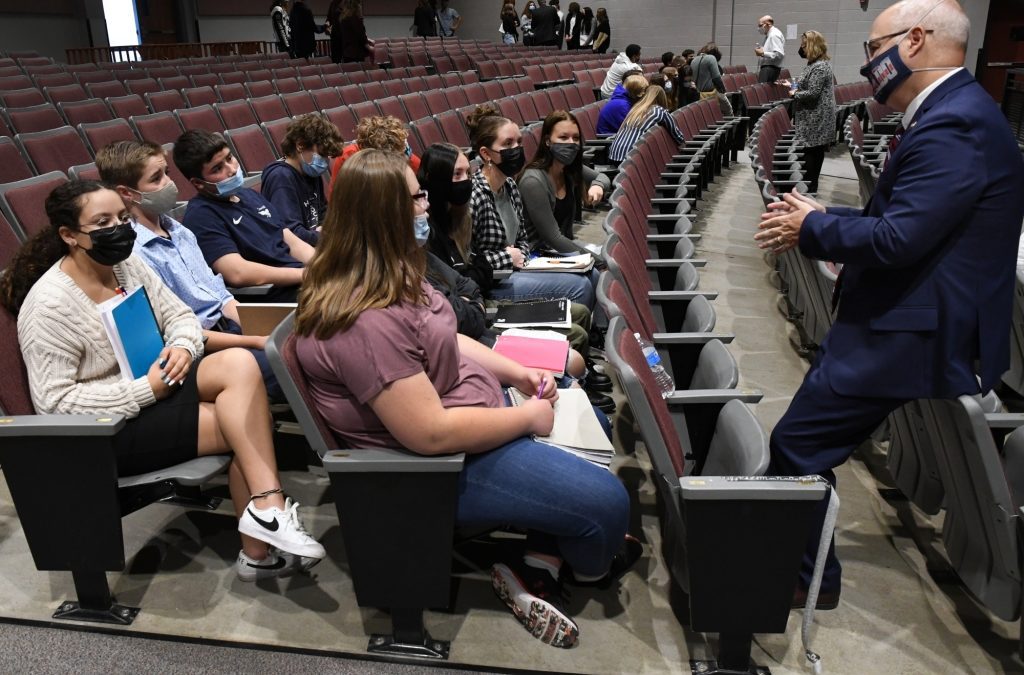Colorado Supreme Court Justice Carlos Samour Jr. quizzed the line of ninth-grade boys seated before him in the auditorium at Pomona High School in Arvada on their names, ages and what they might want to do when they grow up.
Anyone want to go to law school?
“No, law school is too expensive,” one boy piped up.
Samour leaned against the auditorium seat and surveyed the boys’ 14- and 15-year-old faces. Then he told them of immigrating to the United States from El Salvador when he was 13.
“When I came here, I didn’t speak English, I didn’t have any friends and I didn’t know the culture,” he told them, encouraging them to apply for scholarships and work hard. “We didn’t have any money either… If you guys are interested, whatever you are interested in, you can do it.”

The meetings between small groups of students and the state’s Supreme Court justices came after the justices literally held court in the school’s auditorium Tuesday.
The Colorado Supreme Court justices heard oral arguments in two cases at the school before an audience of students and staff as part of the judicial branch’s Courts in the Community initiative, an outreach program that brings the state’s high court to various different settings. The initiative began in 1986, was put on hold for the coronavirus pandemic, and returned for the first time since COVID-19 on Tuesday.
“One of my least favorite parts of this job is we don’t get to see people as often as we do in the trial court,” Justice William Hood told the students. “We are kind of hidden away in offices and it’s nice to be out in the community with all of you. This is kind of a special thing for all of us, especially as we come out of the pandemic.”
A few students dozed through the two hours of dense oral arguments, but others paid close attention and asked relevant questions of the attorneys after the arguments concluded.
In the first case heard Tuesday, the justices considered whether a woman who tripped on a 2.5-inch deviation in a Boulder sidewalk in 2017 can sue the city. The fall shattered the woman’s right elbow and broke her left elbow, forcing her to undergo multiple surgeries.
At issue is whether the sidewalk’s disrepair was a “dangerous condition” that would allow the woman to sue Boulder despite the Colorado Governmental Immunity Act, which prevents such lawsuits except when certain exceptions apply — like when a dangerous condition exists.
Attorneys for Boulder argued in court filings that there were many sidewalks in Boulder in disrepair — there are about 4,000 deviations that need to be fixed — and that to waive governmental immunity in this case would expose the city to unreasonable liability and place on it “an impossible burden.”

“There is a risk the Governmental Immunity Act would be rendered meaningless, at least in these types of cases,” attorney Luia Toro, representing Boulder, told the justices.
The second case centered around expert testimony given in a trial for a man who fired a gun through his windshield during a Fort Collins police pursuit. The man claimed he fired the gun accidentally as he was shifting gears; a police expert for the prosecution testified that the angle of the bullet hole through the glass likely meant the man was holding the gun up and intentionally fired. The expert, however, did not have specific training in analyzing bullet holes in glass.
The man who fired the gun was convicted of attempted second-degree murder, among other charges, and he was sentenced to 24 years in prison. He appealed the conviction on the grounds that the prosecution’s expert was unqualified.
“Here, the trial court failed in its gatekeeping duties by admitting junk science,” attorney James Hardy argued for the public defender’s office.
As the justices mingled with students after the proceedings, student Kaiden Bretz, 14, said watching the court in action strengthened his desire to become an attorney.
“I love to speak my mind and talk,” he said, “so this would be fun for me.”
This content was originally published here.

